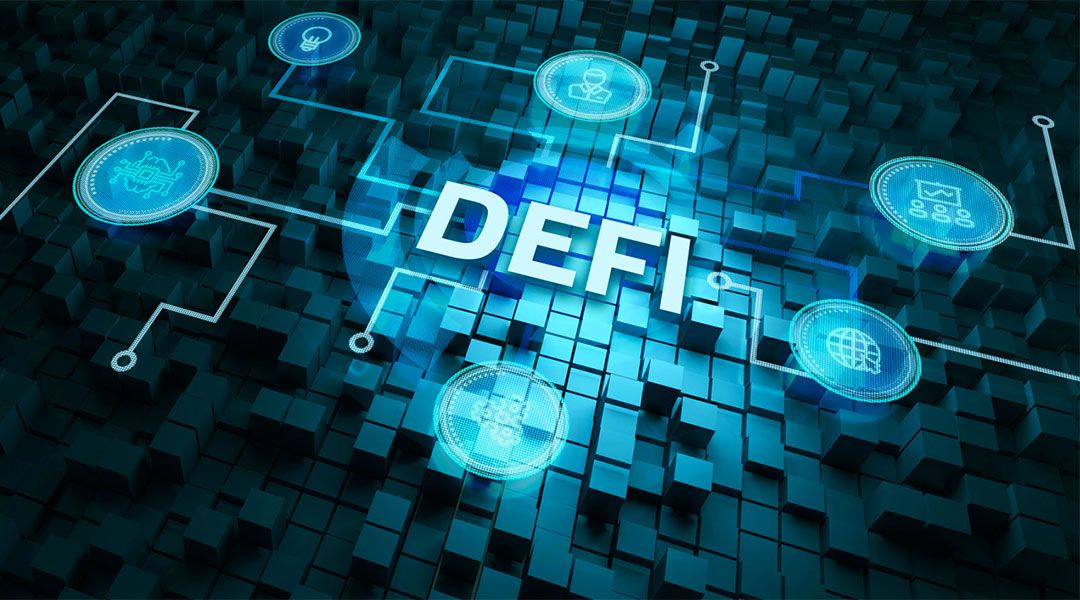How Decentralised Finance Will Change the World's Economy

Blockchain offers many new solutions for existing applications. Two of the most exciting applications are supply chain and finance. Blockchain will be the gold standard for supply chain, and it will revolutionise the current financial system. Decentralised Finance (DeFi) will make a game-changing impact on the world in dozens of different economic dimensions.
DeFi can address many of the flaws in the existing financial systems, including giving the unbanked access to the financial system. In the coming years, DeFi can offer improved transparency, more robust security while replacing many of the outdated processes.
What is Decentralised Finance?
Decentralised Finance, or Open Finance, is all about creating a global, decentralised alternative to every financial service that exists today, including insurance, savings, loans, etc. It will bring financial activities to anyone with a smartphone and an internet connection. The objective of DeFi is to bring financial services to 1.7 billion unbanked people and catapult them into the global economic system.
DeFi services will be decentralised Apps (dApps) that operate on a blockchain, for example, Ethereum. They leverage smart contracts to automate many of the functionalities in financial services. Although such dApps remove the need for trust in the absence of a centralised governing body, any organisation developing dApps requires a strong focus on data governance.
Laws, rules and regulations can be programmed into a blockchain or token so that they are enforced automatically. This will make governance in the financial sector easier, or even automatic, although it will still require, of course, a lot of attention. Nevertheless, a distributed ledger can act as legal evidence for data, increasing the importance of data ownership, data transparency and auditability and offering unique advantages over the existing financial system.
Advantages DeFi over Traditional Finance
Traditional financial systems use systems of banks and intermediaries to complete a single transaction between parties. This can take up several days and comes at a cost. A decentralised financial system is one where transactions occur between one individual and another individual, with no middlemen. Governed by smart contracts, the transactions are (nearly) instant and (almost) for free.
One of the main advantages of DeFi is that it is borderless. Anyone, anywhere with a smartphone and access to the internet can use these financial services. This will revolutionise banking for the poor and unbanked. All of a sudden, they can securely store value. Using security tokens, they can invest anywhere in the world in anything with the click of a button.
The tokenisation of assets is at the core of decentralised finance. Tokenisation is the process of changing value (e.g. asset) into its digital representative. Once that value is available on distributed ledger technology it can be traded, borrowed against, sold, invested in, etc. by anyone that has access to the DeFi application (i.e. anyone with a smartphone and internet connection). This will revolutionise asset trading across the globe, offering traders new markets and new opportunities. Tokenisation is set to provide increased competitiveness, transparency, liquidity, and accessibility across the world.
Startups Engaged in Decentralised Finance
DeFi has rapidly risen to become one of the most active segments of the blockchain market. While some startups focus on the creation of new financial instruments, there are several startups dedicated to fulfilling existing functions instead. Projects include stablecoins, decentralised exchanges, insurance and lending platforms, marketplaces, investment and derivatives platforms, prediction markets and, of course, DeFi analytics platforms. Let’s explore some startups in the DeFi sphere. For a complete overview of interesting projects in the decentralised finance space, you can view this list compiled by Consensys.
One of the most prominent DeFi platforms is the decentralised lending platform MakerDAO. In recent months it has seen impressive adoption of its stablecoin Dai. MakerDAO is a decentralised autonomous organisation on the Ethereum blockchain, and it is the crypto version of a pawn shop; instead of leaving a watch or a ring, the person leaves crypto, i.e. ETH. Whenever the user pays back the DAI received when leaving the ETH, the ETH is returned. MakerDAO is a popular crypto pawnshop as currently around $300 million ETH is locked away in smart contracts.
Compound
Compound is an algorithmic, autonomous interest rate protocol built for developers, to unlock a universe of open financial applications. It enables individuals to borrow up to a percentage of their token’s value with no fees and the immediate ability to liquidate. They aim to enable crypto that sits currently idle on exchanges to yield interest while maintaining liquidity.
IDEX
Centralised exchanges are well-known, but although they might be easy to use, they have one major Achilles heel; they are centralised and can, therefore, be hacked. We have seen many hacks over the past years resulting in millions of dollars in lost crypto. Decentralised exchanges fix this flaw. There is no centralised governing entity. Instead, smart contracts engage in decentralised exchanges that execute automatically and require no intermediary. All assets are controlled by their owners and the system only plays matchmaker to connect buyers and sellers with seamless algorithms.
Bounties Network, Gitcoin
These DeFi startups provide simple open marketplaces where anyone can exchange goods and services built along with decentralised architecture. Bounties Network offers a platform to create projects, collaborate and get paid in crypto for doing jobs in any domain. Gitcoin is a decentralised version of Github and is a marketplace for open source development work. Contrary to popular traditional marketplaces like Amazon, these platforms themselves don’t exert control over their marketplaces. Buyers and sellers dictate the terms of the marketplace without interference of any central authority.
Augur
Augur is built on Ethereum, and it offers a prediction market that is resistant to censorship and can provide a valuable peek into the public perception. Such decentralised prediction markets can alert you about real-world events, policies, and risks in the real world that are free for anyone and everyone to speculate about. Users can create predictions on any topic, including controversial ones.
Descrow
Decentralised escrow services where traders can trade safely. The escrow holds onto your currency while the trades are done on off-chain or on-chain atomic swaps that are seamlessly handled by smart contracts. The blockchain itself functions as the escrow in many cases, with negligible risk.
Traditional Institutions and Decentralised Finance
Traditional institutes have taken note of the rise of DeFi with great interest. According to a 2019 report by the Financial Stability Board, decentralised financial technologies could offer improved financial stability, greater competition and a more diverse financial system, while reducing the importance and impact of existing entities. However, DeFi could also bring risk to the financial system, including control and ownership of large amounts of crypto that could affect monetary policy (read: Libra). In addition, there are still many unknowns in terms of consumer and investor protection, and across the globe, regulation is behind.
Banks, insurers, and investors, in particular, have noted the scope of DeFi for their industries, especially where decentralisation can dramatically alter existing services to improve efficiency and lower costs in a single move.
Overall, banks are positive on the impact of DeFi and how it can improve the banking infrastructure. They expect that decentralisation will improve decision-making in economic systems, will reduce risks (such as credit or liquidity risks due to instant settlements of transactions) and will improve record-keeping. However, they will have to catch up quickly because new DeFi startups can disrupt existing business models rapidly.
Insurance companies are also closely watching the rise of decentralised finance. Startups such as Etherisc have built a decentralised insurance protocol to collectively build insurance products. The Decentralised Insurance Platform allows users to develop smart contracts that digitally facilitate, enforce, and verify the terms and performance of an insurance contract. Such smart contracts handle fraudulent claims with ease, with countermeasures to dissolve the payments and return them to the rightful party in the event of a breach of contract. New players can easily disrupt existing, large insurance companies that are slow to adapt.
Many traditional investors are still wary of the potential of Decentralised Finance. Although security tokens offer significant benefits for both the issuer as the investor, many still perceive them as extremely risky. Indeed, the decentralised ecosystem is still being developed, i.e. there are only a few regulated decentralised exchanges to trade security tokens, but I certainly believe that security tokens are the future of funding and investing.
Conclusion
Decentralised finance is equipped to fundamentally change the world economy. With blockchain technology spearheading the front, decentralisation is set to bring back privacy, trust, and let individuals create a future where a transparent, secure, public system is in control once again.
DeFi will enable the unbanked to join the economic system, it will lower the cost of doing business, and it will offer new investment opportunities for anyone across the globe. It will empower individuals and organisations and make them less reliant on the ‘too big to fail’ financial institutions that brought chaos during the Great Recession. The future is decentralised, and that certainly applies to the financial sector.





